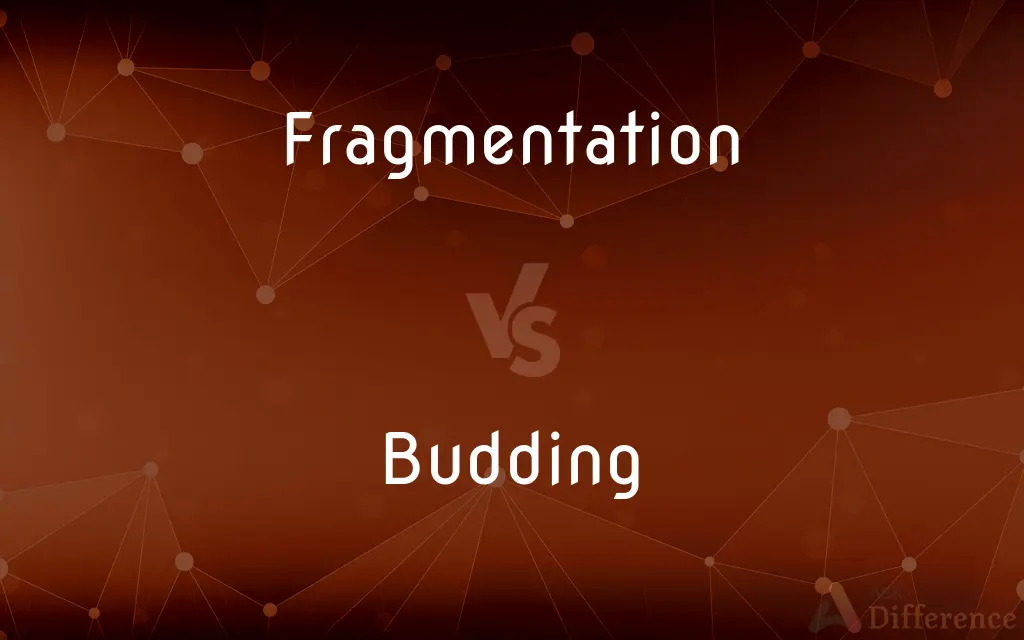Fragmentation vs. Budding — What's the Difference?
Edited by Tayyaba Rehman — By Maham Liaqat — Updated on April 15, 2024
Fragmentation is a form of reproduction where an organism breaks into fragments, each capable of growing into a new organism, whereas budding involves the growth of a new individual from a specific part of the parent body.

Difference Between Fragmentation and Budding
Table of Contents
ADVERTISEMENT
Key Differences
Fragmentation occurs when an organism breaks into two or more fragments due to physical disturbance or as a part of the reproductive strategy; each piece then regenerates into a full organism. On the other hand, budding involves the formation of a new organism from a growth on the parent, which eventually detaches and becomes independent.
In fragmentation, the organisms involved usually do not have a predetermined site for separation; the break can occur at any part of the body that has the capability to regenerate. Whereas, in budding, the new organism develops from a specific region where cells accumulate and grow outward.
Fragmentation is common in organisms such as starfish, sponges, and some annelid worms, where structural simplicity allows easy regeneration. On the other hand, budding is seen in yeasts, hydra, and certain plants, where a bud forms as a clone of the parent organism.
The rate of reproduction through fragmentation can be variable and often accidental, not necessarily a regular mode of reproduction. Whereas budding is a deliberate, regular process of reproduction controlled by biological mechanisms within the organism.
Fragmentation does not involve any growth on the parent body but is a process of regeneration from the parts. In contrast, budding involves the initial growth of a new part, which then develops into a new individual while still attached to the parent.
ADVERTISEMENT
Comparison Chart
Site of Reproduction
Any capable part of the body
Specific predetermined site on the parent body
Typical Organisms
Starfish, sponges, annelid worms
Yeasts, hydra, certain plants
Reproduction Rate
Variable, often accidental
Regular and controlled
Growth Pattern
No new growth, just regeneration
Involves new growth from the parent
Compare with Definitions
Fragmentation
Each fragment regenerates missing parts to form a new organism;
A starfish arm, separated from the main body, can grow into a whole new starfish.
Budding
Involves the growth of a new individual from a particular part of the parent;
Hydra form buds that develop into new individuals.
Fragmentation
A process where an organism breaks into fragments, each capable of growing into a new individual;
When the sponge is torn apart during a storm, each piece can become a new sponge.
Budding
The new individual is genetically identical to the parent;
Each bud produced by a yeast cell is a clone of the parent.
Fragmentation
The rate of reproduction can be unpredictable;
Fragmentation rates in sponges vary greatly depending on environmental conditions.
Budding
The new organism develops from a specific site on the parent body;
Buds form on the specific branches of yeast cells.
Fragmentation
Occurs at any part of the body capable of regeneration;
Planaria can regenerate from almost any segment of their body.
Budding
A regular mode of reproduction controlled by biological mechanisms;
Budding in hydra is a common and predictable reproductive strategy.
Fragmentation
Often occurs due to physical disturbances;
Fragmentation in annelid worms often happens accidentally when they are handled roughly.
Budding
Involves the initial outward growth of a new part;
The bud of a plant grows outward before becoming an independent plant.
Fragmentation
The act or process of breaking into fragments.
Budding
Being in an early developmental stage
A gallery with the works of budding artists.
Fragmentation
The scattering of the fragments of an exploding bomb or other projectile.
Budding
Beginning to develop.
He's a budding deejay.
Fragmentation
(Computers) The scattering of parts of a file or files throughout a storage device, as when the operating system breaks up the file and fits it into the spaces left vacant by previously deleted files.
Budding
(horticulture) The practice of uniting a single scion bud with rootstock or bark.
Fragmentation
The act of fragmenting or something fragmented; disintegration.
Budding
(horticulture) The result of this practice.
Fragmentation
The process by which fragments of an exploding bomb scatter.
Budding
Present participle of bud
Fragmentation
(computing) The breaking up and dispersal of a file into non-contiguous areas of a disk.
Budding
The act or process of producing buds.
Fragmentation
(computing) The breaking up of a data packet when larger than the transmission unit of a network.
Budding
The act or process of ingrafting one kind of plant upon another stock by inserting a bud under the bark.
Fragmentation
The act or process of separating something into small pieces or fine particles.
Budding
Reproduction of some unicellular organisms (such as yeasts) by growth and specialization followed by the separation by constriction of a part of the parent
Fragmentation
Separating something into fine particles
Budding
Beginning to develop;
A budding genius
Fragmentation
The disintegration of social norms governing behavior and thought and social relationships
Fragmentation
(computer science) the condition of a file that is broken up and stored in many different locations on a magnetic disk;
Fragmentation slows system performance because it takes extra time to locate and assemble the parts of the fragmented file
Fragmentation
The scattering of bomb fragments after the bomb explodes
Common Curiosities
What is the main difference in reproduction sites between fragmentation and budding?
In fragmentation, reproduction can occur at any capable body part, whereas budding occurs at specific predetermined sites.
How does budding ensure genetic consistency?
Budding produces a new individual by cloning the genetic material of the parent, ensuring genetic consistency.
How do environmental conditions affect fragmentation?
Environmental conditions such as water currents and physical disturbances significantly influence the rate and success of fragmentation.
Is fragmentation a deliberate reproductive strategy?
Fragmentation can be both an accidental result of disturbance and a natural reproductive strategy depending on the organism.
Can both fragmentation and budding occur in the same species?
Yes, some organisms like certain corals and fungi can reproduce both by fragmentation and budding depending on the conditions.
Which reproduction method is quicker, fragmentation or budding?
Budding is generally quicker as it is a regular and controlled process, whereas fragmentation can be slower due to the need for regeneration.
Are organisms produced by budding always independent immediately?
No, organisms produced by budding remain attached to the parent until they are sufficiently developed to survive independently.
Which organisms typically reproduce by fragmentation?
Organisms such as starfish, sponges, and some annelid worms typically reproduce by fragmentation.
What advantages does budding offer over fragmentation?
Budding is more controlled and predictable, often allowing the parent to produce multiple offspring in a relatively stable environment.
What are the risks associated with fragmentation as a reproductive method?
Risks include the dependence on environmental factors for regeneration and the potential for incomplete organism development.
What role does cell specialization play in budding?
In budding, specialized cells at the site of the bud accumulate and divide to form the new organism.
How does the structural simplicity of an organism affect its ability to fragment?
Organisms with simpler structures are more capable of fragmentation as they can regenerate lost parts more easily.
How does fragmentation contribute to an organism's survival strategy?
Fragmentation can help organisms quickly colonize new areas or recover from physical damage.
Can budding be induced artificially in some organisms?
Yes, in some plants and fungi, conditions conducive to budding can be artificially created to encourage reproduction.
What mechanisms control budding in plants and animals?
Hormonal signals and genetic regulatory mechanisms control budding in both plants and animals to ensure proper development.
Share Your Discovery

Previous Comparison
Thick vs. Fat
Next Comparison
Gab vs. GibAuthor Spotlight
Written by
Maham LiaqatEdited by
Tayyaba RehmanTayyaba Rehman is a distinguished writer, currently serving as a primary contributor to askdifference.com. As a researcher in semantics and etymology, Tayyaba's passion for the complexity of languages and their distinctions has found a perfect home on the platform. Tayyaba delves into the intricacies of language, distinguishing between commonly confused words and phrases, thereby providing clarity for readers worldwide.















































